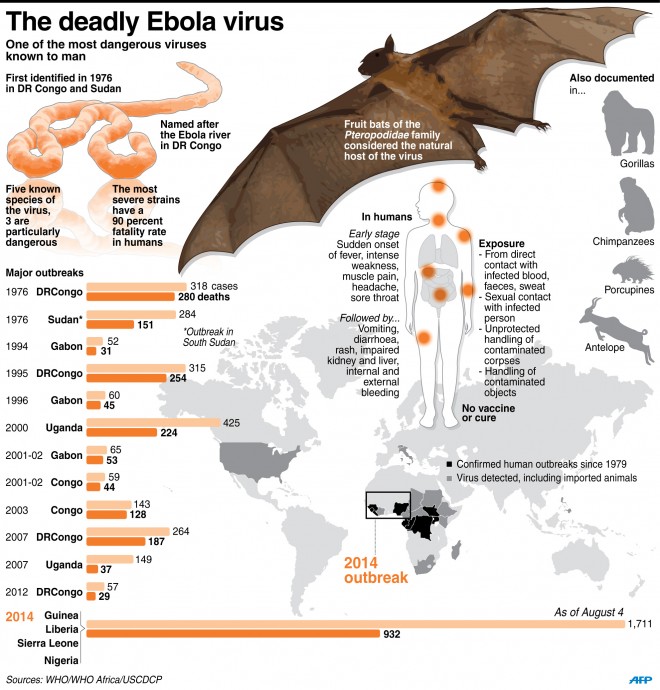State of emergency declared in Liberia over Ebola outbreak

Factfile on the Ebola virus, with the latest numbers in the west African outbreak that has claimed 932 lives. AFP
MONROVIA — Liberia declared a state of emergency Wednesday due to the deadly Ebola outbreak as US President Barack Obama said it was premature to send experimental drugs to victims in Africa.
Declaring the state of emergency overnight President Ellen Johnson Sirleaf warned that the extraordinary measures were needed “for the very survival of our state”.
The Liberian parliament will meet Thursday to ratify the move, while its Sierra Leone counterpart does the same following a state-of-emergency declaration there last week.
Speaking of “a clear and present danger” from the virus which has claimed almost 1,000 lives in West Africa, Sirleaf announced that the state of emergency should last for a minimum of 90 days.
“The scope and scale of the epidemic, the virulence and deadliness of the virus now exceed the capacity and statutory responsibility of any one government agency or ministry,” she said.
Article continues after this advertisementAmid growing call for international help, Obama said it was too early to dispatch experimental drugs to Ebola victims in Africa.
Article continues after this advertisementTwo Americans who worked for Christian aid agencies in Liberia were brought back to the United States for treatment in recent days.
They are being given an experimental drug known as ZMapp, which is hard to produce on a large scale and have been showing signs of improvement.
The latest official toll across West Africa hit 932 deaths since the start of the year, the World Health Organization (WHO) said, with 1,711 confirmed cases, mostly in Guinea, Liberia and Sierra Leone.
Fears are growing that the disease is also taking hold in Nigeria.
The death of a nurse in Lagos, a megacity of more than 20 million, came as 45 deaths were confirmed across west Africa between Saturday and Monday, with aid agencies, including Doctors Without Borders, saying the terrifying tropical disease is out of control.
Nigeria’s Health Minister Onyebuchi Chukwu told reporters he was in contact with the US Center for Disease Control on the possibility of getting drugs from them.
“I said we are getting reports that this experimental drug seems to be useful. Is it also possible that we can have access for our people presently being treated and under incubation,” he said.
However Obama said affected countries should focus on building a “strong public infrastructure,” adding: “I don’t think all the information is in on whether this drug is helpful.”
Chukwu said all seven confirmed cases in his country had “primary contact” with Patrick Sawyer, a Liberian finance ministry employee who brought the virus to Lagos on July 20 and died later in hospital.
WHO emergency session
The spread of the disease comes as the WHO met in an emergency session in Geneva to decide whether to declare an international crisis.
The closed-door WHO meeting was not expected to make a decision until Friday. But the session itself underscored the severity of the threat posed by the disease, which causes severe fever and unstoppable bleeding.
In Liberia’s capital Monrovia the dead have been left unburied on the streets or abandoned in their homes.
And in Sierra Leone, which has the most confirmed infections, 800 troops including 50 military nurses were sent to guard hospitals and clinics treating Ebola patients, an army spokesman said.
The soldiers’ colleagues coming to the end of a tour with the African Union peacekeeping force in Somalia were ordered Wednesday to remain in the war-torn country rather than risk returning home because of Ebola.
Also Wednesday, a Spanish air force plane left for Liberia to bring an infected Spanish missionary priest home for treatment.
The US disease control and prevention body on Wednesday issued its highest alert for an all-hands on deck response to the Ebola crisis in West Africa.
Level 1 is the highest on a 1-6 scale and signals that increased staff and resources will be devoted to the outbreak.
Possible Saudi case
Meanwhile a Saudi Arabian who had travelled to Sierra Leone and developed Ebola-like symptoms died on Wednesday of a heart attack, the health ministry said.
Officials did not disclose the results of the Ebola tests conducted abroad, but said he would be buried in an Islamic manner under precautions laid down by world health authorities.
The new global head of the Red Cross warned that Ebola will be contained only if the public is won over, saying “stigma and discrimination often kill as much as viruses”.
Elhadj As Sy said lessons had to be learned from the fight against AIDS and that dishing out blame does not help.
“It’s very difficult in a west African cultural setting to tell people not to engage with their loved ones who are sick. But in this current situation they will have to do so,” he told Agence France-Presse.
In addition, people must shun time-honored burial rites that require relatives to wash the body of the dead, as Ebola victims remain contagious after death.
First discovered in 1976 and named after a river in what is now the Democratic Republic of Congo, Ebola spreads through contact with bodily fluids such as blood, saliva and sweat.
It has killed around two-thirds of those it has infected over the last four decades, with two outbreaks registering fatality rates approaching 90 percent. The latest outbreak has a fatality rate of around 55 percent.
RELATED STORIES
PH airports on full alert for Ebola virus
Ebola-hit west Africa launches emergency battle plan
Ebola watch: 7 Filipinos from Africa checked daily